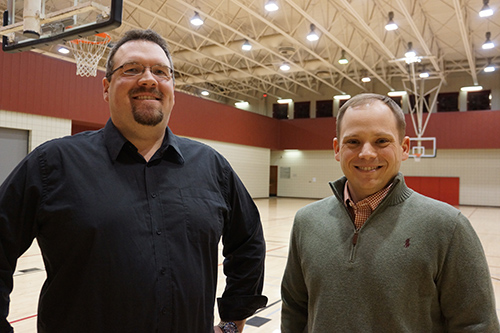Research by Professor, Student Looks at Sports Sponsorship in New Way
University of Arkansas researchers recently published an article describing their findings when they took a new approach to examining fan attachment and its relationship to corporate sponsorships in sports.
Terry Eddy, an assistant professor of recreation and sport management, and Colin Cork, a doctoral student in the program, published an article in the journal Sport Marketing Quarterly about their study.
"A lot of people study how attached fans are to a particular team or athlete, myself included," said Terry, who joined the faculty of the College of Education and Health Professions in 2014. "A new approach that's gaining traction is to look at fan attachment from a multidimensional perspective. A person with an emotional connection to the Razorbacks may not have a connection just to football but to other U of A sports, to the university itself, the city of Fayetteville, the state of Arkansas and to individual players.
"The overall question about sponsorship is does it work?" Eddy continued. "Are sponsors satisfying their business objectives through these partnerships? Are Razorback fans more likely to buy Pepsi over Coke or sign an AT&T contract over Verizon because those companies sponsor Razorback athletics? Depending on the nature of the sponsor's objectives, sometimes we have a good idea of whether the sponsorship is working, and other times it is more unclear and complex."
Eddy and Cork looked further afield than Arkansas athletics, however, studying fans of mixed martial arts, specifically the Ultimate Fighting Championship.
Cork explained that the success of athletic organizations ultimately depends on revenue generation.
"That's interesting to me because it's all about fan response to sponsorship material and understanding consumer behavior," said Cork, who earned bachelor's and master's degrees from Mississippi State. "How do fans respond? What about them causes them to behave the way they do?"
The pair used a theoretical framework called points of attachment to look at the different aspects of the Ultimate Fighting Championship to which fans might form an attachment – league, fighter, sport and level of competition – as well as four measures of sponsorship effectiveness – attitudes toward UFC sponsors, attitudes toward individual fighter sponsors, UFC sponsor purchase intentions and individual fighter sponsor purchase intentions.
Their results indicated that attachment to the league is most effective at predicting sponsorship effectiveness.
"In our study, fans in general are more attached to the league and the sport of mixed martial arts overall than to a specific fighter," Cork said. "Fans enjoy following the sport more so than the individual fighter."
UFC signed an exclusive league-wide sponsorship with Reebok last year, he said. All UFC fighters will wear Reebok apparel. Eddy and Cork plan to conduct additional research on how the UFC fighters use social media such as Twitter to promote Reebok.
These findings should not be immediately generalized to other sports, both men said, because the UFC represents a somewhat unique league structure. Sponsors who invest in individual players who play in sports with bigger stars, such as the NBA and NFL, benefit from promoting those individual players.
"You have to look for what works best for each sport, because fan response to sponsorships will vary from sport to sport," Cork said.
The Reebok contract with UFC is controversial, Cork said, and several fighters publicly disagreed with the move that included a tiered payout system based on the number of fights and other aspects. UFC fighters used to sign their own sponsors, wearing the sponsors' logos when they fought.
"That's how they made money," Cork said. "The prizes are not as high as in boxing, for example."
Eddy said, historically, corporations have spent money on sponsorships with a little degree of blind faith. In the mid-20th century, some companies became involved in sponsorship as sort of an ego booster for high-level executives who wanted to be affiliated with a popular sports team or athlete.
People realized they had tapped into something and that sports fans represent desirable segments of consumers for many types of products, he said. Consequently, companies are now engaging research to determine their return on investment from sport sponsorships.
"There's still a lot we don't know," Terry said.
First author of the Sport Marketing Quarterly article was Lamar Reams of Old Dominion University.
Contacts
Heidi Wells, director of communications
College of Education and Health Professions
(479) 575-3138,
heidisw@uark.edu
Headlines
PetSmart CEO J.K. Symancyk to Speak at Walton College Commencement
J.K. Symancyk is an alumnus of the Sam M. Walton College of Business and serves on the Dean’s Executive Advisory Board.
Faulkner Center, Arkansas PBS Partner to Screen Documentary 'Gospel'
The Faulkner Performing Arts Center will host a screening of Gospel, a documentary exploring the origin of Black spirituality through sermon and song, in partnership with Arkansas PBS at 7:30 p.m. Thursday, May 2.
UAPD Officers Mills and Edwards Honored With New Roles
Veterans of the U of A Police Department, Matt Mills has been promoted to assistant chief, and Crandall Edwards has been promoted to administrative captain.
Community Design Center's Greenway Urbanism Project Wins LIV Hospitality Design Award
"Greenway Urbanism" is one of six urban strategies proposed under the Framework Plan for Cherokee Village, a project that received funding through an Our Town grant from the National Endowment for the Arts.
Spring Bike Drive Refurbishes Old Bikes for New Students
All donated bikes will be given to Pedal It Forward, a local nonprofit that will refurbish your bike and return it to the U of A campus to be gifted to a student in need. Hundreds of students have already benefited.





